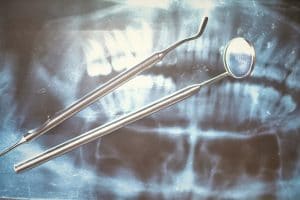 When many people think of gingivitis, they consider it the kind of condition their dentists can address during their next routine checkup and cleaning appointment. Sometimes, this is the case, and early dental treatment can help them avoid more serious trouble. However, in more advanced cases of periodontal disease, the complex nature of the disease and its potential affects on your periodontal tissues could require treatment by a periodontal specialist.
When many people think of gingivitis, they consider it the kind of condition their dentists can address during their next routine checkup and cleaning appointment. Sometimes, this is the case, and early dental treatment can help them avoid more serious trouble. However, in more advanced cases of periodontal disease, the complex nature of the disease and its potential affects on your periodontal tissues could require treatment by a periodontal specialist.
The intricate nature of periodontal disease
Periodontal disease, often referred to as gum disease, is a chronic condition that systematically destroys the periodontal tissues (gums) and ligaments that support your teeth roots. Gingivitis is the first stage of this disease, and as such, it’s the most minor form of it. However, it doesn’t take long for the bacterial infection to progress and begin to cause extensive damage to your smile’s foundation. Depending on the extent of your periodontal disease, addressing it could mean more than just removing bacteria from underneath your gum tissues, and may involve more complex restoration of your diseased gum tissues.
The compounding effects of its progression
As it progresses, the different impacts that periodontal disease can have on your oral tissues and structures can often be more complex than a general dentist is able to address. If so, your dentist may recommend you to a periodontal specialist to not only deal with the disease itself, but also the compounding effects and consequences that severe periodontal disease can lead to. For example, because of the erosion of your periodontal tissues and jawbone structure, periodontal disease is the leading cause of adult tooth loss. The inflammation that it causes can also negatively impact your systemic wellbeing, increasing your risks of developing chronic inflammatory conditions such as cardiovascular disease.
The comprehensive approach to managing it
With the help of a periodontal specialist, you can successfully deal with periodontal disease in a way that stops its progression and reduces the risks it might pose to your oral and systemic wellbeing. For instance, if necessary, you may require periodontal surgery or pinhole gum grafting to build up your healthy periodontal tissues. Advanced periodontal treatment options, such as ozone and platelet-rich therapies, can also help promote substantial tissue healing, minimizing the extent of any further periodontal treatment. If you’ve experienced tooth loss because of your periodontal disease, your periodontist can also help you regain your good oral health by placing one or more dental implants to replace them.
Restore and maintain your periodontal health
When you develop periodontal disease, addressing the concern and preserving your good oral health could require the skills and experience of a periodontal specialist. For more information, schedule a consultation with Dr. Kania by calling her periodontal office in Encinitas/San Diego, CA, at (760) 642-0711.



